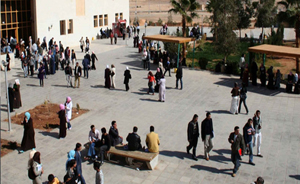News
EU program seeks to modernize higher education in Middle East and North Africa
News |
An educational program established by the European Union more than two decades ago to guide countries born from the wreckage of the Soviet Union toward a modern higher educational system has extended its arm to Middle East and North African currently undergoing extensive socio-political and economic changes.
For decades following the decolonization period, educational institutions in the Middle East and North Africa were viewed more as instruments of social control than agents of liberation.
Education was long used to foster the Arabic language, pan-Arab identity and promote and protect various Islamic Sunni schools of thought. In essence, education was mainly used to protect the existing social and cultural fabrics.
Liberal curricula ─ which encourages critical thinking and promotes individual initiatives outside certain national and religious frameworks ─ were generally suppressed.
Today, the MENA region has one of the largest cohorts of young people in the world, in proportion to its population. As this cohort works its way through the education system, it will likely generate enormous demands for new learning opportunities and stronger expectations of better results. Globalization has led to a demand for a different mix of skills and competencies, and will influence the content and nature of what education systems should provide.
The Trans-European Mobility Program for University Studies (TEMPUS), sponsored by the European Commission, is considered by the EU’s Education, Audiovisual and Culture Executive Agency (EACEA) as “an important element of the EU external policy” that “continues to support in priority bottom-up multi-lateral cooperation.”
In 2008, the program entered a new phase with a budget of $66 million (50 million euro) to fund projects that target countries within the EU’s wider vicinity, including countries from the Mediterranean (MEDA) region.
One of these projects is led by Cardiff Metropolitan University and coordinated by the Dean of International Education, Dr. Mohamed Loutfi. It seeks to empower leaders in higher education, enabling university leaders, management, and executives to come together in a virtual network to discuss and learn about advanced EU-standard management tools, methods and attitudes.
On April 11, a team of educational and IT professionals, from Morocco, Egypt , Tunisia, Italy, UK, and Switzerland came together at the University of Bari, in Italy to produce course material using Adaptive Learning technology developed by Bari University’s Osel Consulting.
The produced courses will be made available on the internet for university personnel at the dean and vice dean level of responsibly.
Professor Alfredo Moscardini who manages the project noted that virtual material produced will be put together into modules which can then be used at the Masters level at the TEMPUS partner universities.
He said one objective of this project is to provide a “vision for the future” and help university personnel embrace modern pedagogies and “raise their awareness about the role universities can play in economic and social development.”
The project also seeks to promote gender balance in higher education through the establishment of a regional club for women-leaders, known as the Women in Higher Education Elite Leaders (WHEEL). Another objective of the TEMPUS program is to involve women in developing the material to be used for the e-learning modules in order to make sure that women’s needs in higher education are addressed.
According to a statement on the TEMPUS website, the club was designed to be “more than a club where women - and why not men - would meet from time to time to share recriminations about opportunity imbalances between gendersin academia. The actions of the club had to steer change; hence the choice of the label WHEEL.”
The regional women’s network says it also seeks “to show the members’ commitment to work on making change happen in the partner universities.”
Source: alarabiya.net
Back

